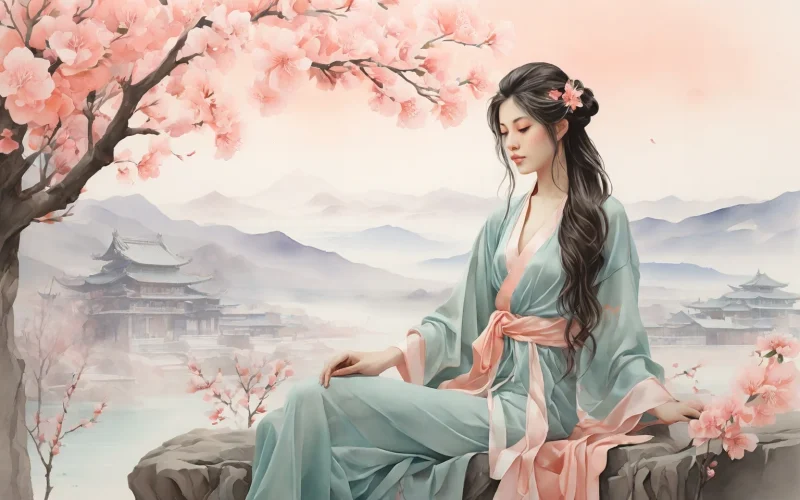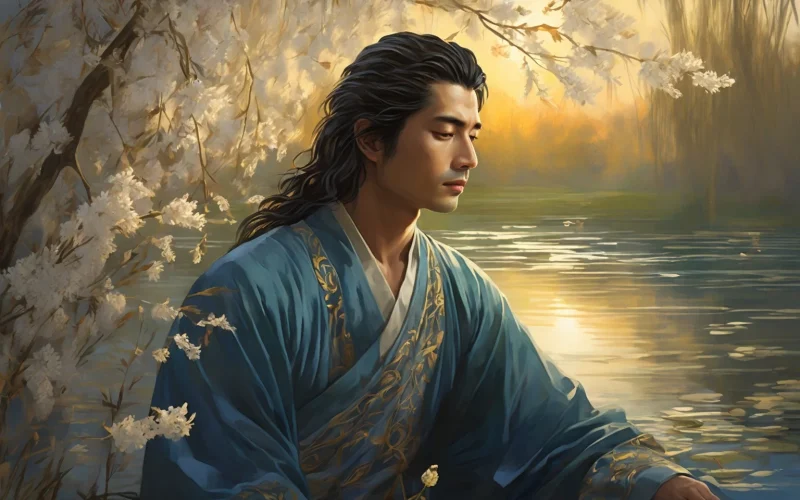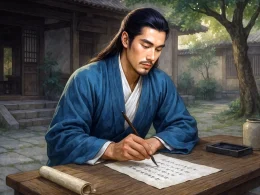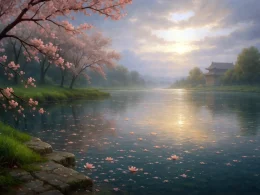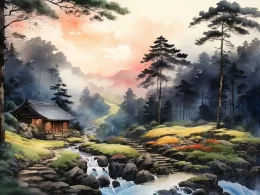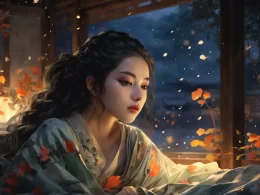Twin peach blooms blush deeper at dusk’s call,
Peeping through bamboo by my window tall.
They must have trailed celestial scribes to earth,
To grace this scholar’s court with heaven’s mirth.
Original Poem
「春雪」
韩愈
新年都未有芳华,二月初惊见草芽。
白雪却嫌春色晚,故穿庭树作飞花。
Interpretation
Composed during Han Yu's residence in the capital, this poem transforms an encounter with rare palace peach blossoms into a meditation on constrained beauty. The "double-petaled peach" (百叶桃), a cultivated variety prized for its layered splendor, becomes an emblem of exquisite talent trapped within imperial structures—a subtle critique of court politics that aligns with Han Yu's lifelong concern for intellectual freedom amid bureaucratic confinement.
First Couplet: "百叶双桃晚更红,窥窗映竹见玲珑。"
Bǎi yè shuāng táo wǎn gèng hóng, kuī chuāng yìng zhú jiàn línglóng.
The double peach, late-blooming, burns redder still— / Peering through windows, gleaming through bamboos' lattice.
The poet highlights temporal paradox: delayed flowering ("late-blooming") intensifies rather than diminishes the blossoms' brilliance. "Peering" (窥) animates the plant with almost furtive agency, as if straining against its gilded cage. The interplay of floral crimson and bamboo verdure creates a chromatic tension—natural vibrancy framed (and contained) by artificial order.
Second Couplet: "应知侍史归天上,故伴仙郎宿禁中。"
Yīng zhī shìshǐ guī tiānshàng, gù bàn xiān láng sù jìn zhōng.
Surely some celestial scribe returned to heaven— / Leaving these blooms as immortal's companions in sealed chambers.
Here, mythological allusion deepens the political allegory. The "celestial scribe" (侍史), a minor functionary in Taoist cosmology, mirrors the scholar-official's role—essential yet expendable. That the blossoms now "companion" an "immortal" (仙郎, likely a metaphor for the emperor) suggests beauty's conscription into imperial service. The verb "sealed" (禁) resonates with particular bitterness, evoking both the palace's physical gates and the ideological constraints of court life.
Holistic Appreciation
Comprising merely four lines, this poem achieves remarkable depth in both scene and sentiment. The opening couplet, through phrases like "evening enhances its crimson" and "peeking through windows, reflecting on bamboos," portrays a beauty that is restrained yet radiant—unassuming yet captivating. The subsequent couplet introduces celestial and imperial allusions, revealing that these resplendent peach blossoms are confined within palace walls. Though breathtaking in their brilliance, they are fated to accompany the powerful, severed from the freedom of nature. This emotional pivot creates striking tension, transitioning from visual splendor to existential sorrow, showcasing the poet's profound meditation on the interplay between beauty, humanity, and destiny.
The phrase "lodging within the palace" underscores the flower's captivity—a plight that mirrors the poet's own. Likely using the blossom as a metaphor, Han Yu laments his entrapment in officialdom, bound by power like an immortal flower caged in a royal garden. Despite his talents, he cannot bloom freely, reflecting his perennial struggle with institutional constraints and personal ambition.
Artistic Merits
- Compact Structure, Rich Subtext
The poem's concise form belies its layered meanings, exemplifying Han Yu's mastery of object-inspired verse. - Contrast and Paradox
The "evening-enhanced crimson" highlights extraordinary beauty emerging against expectation, while "peeking through windows, reflecting on bamboos" crafts a scene of hidden allure—dynamic stillness and quiet vitality interwoven. - Seamless Allusion and Symbolism
Natural references to immortals and palaces elevate the poem from literal description to allegorical realm, embodying Han Yu's signature "object as vehicle for ideals" technique. - Intertextual Imagery and Emotional Crescendo
The progression from scene to emotion, object to aspiration, transforms a late-blooming peach blossom into a vessel for the poet's lament on life, ideals, and liberty—leaving an indelible aftertaste.
Insights
Beauty and talent in this world do not always unfurl freely; often, they are shackled by power and systems. The "evening-enhanced crimson" fragrance and the "palace-confined" blossom serve as poignant metaphors for individual worth amid real-world constraints. This poem urges us to cherish innate gifts while recognizing the necessity of fertile ground for unfettered growth. Between appreciation and confinement, perhaps the true significance of beauty lies not in how magnificently it blooms, but in its ability to flourish unrestrained under open skies.
About the Poet
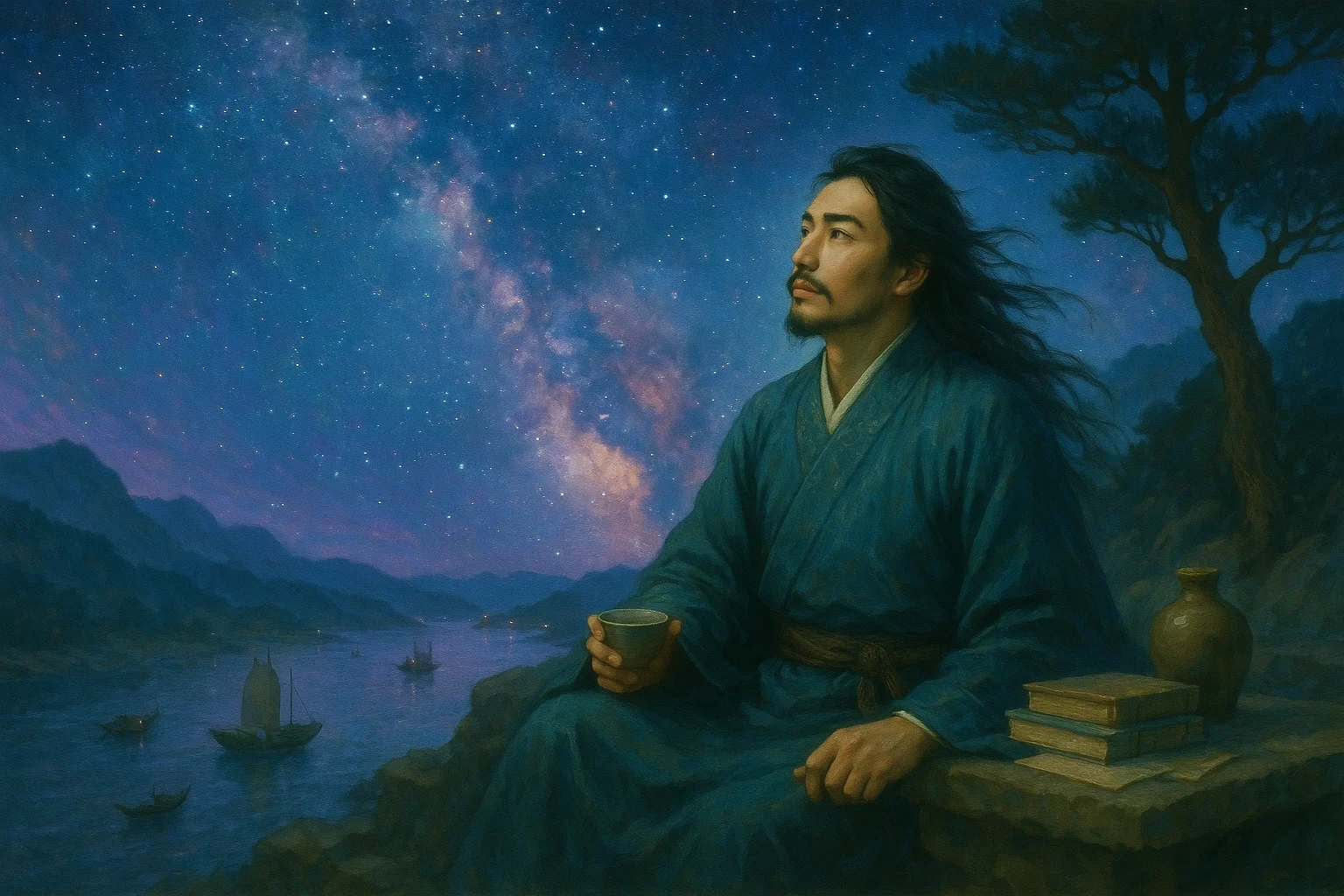
Han Yu (韩愈, 768 - 824), originario de Mengzhou en Henan, fue el líder del Movimiento de la Prosa Antigua durante la dinastía Tang. Obtuvo el título de jinshi en 792 y ascendió al cargo de Viceministro de Personal. Su prosa es vigorosa y poderosa, mientras que su poesía se caracteriza por un estilo audaz y poco convencional. Su poema Rocas de la Montaña (山石) inauguró la técnica de "prosificar la poesía". Fue mentor de poetas como Meng Jiao y Jia Dao, y es considerado el principal de los "Ocho Grandes Maestros de la Prosa de Tang y Song". Sus contribuciones revolucionarias a la literatura tuvieron una influencia profunda y duradera, lo que le valió el título honorífico de "Maestro Literario de las Generaciones".






